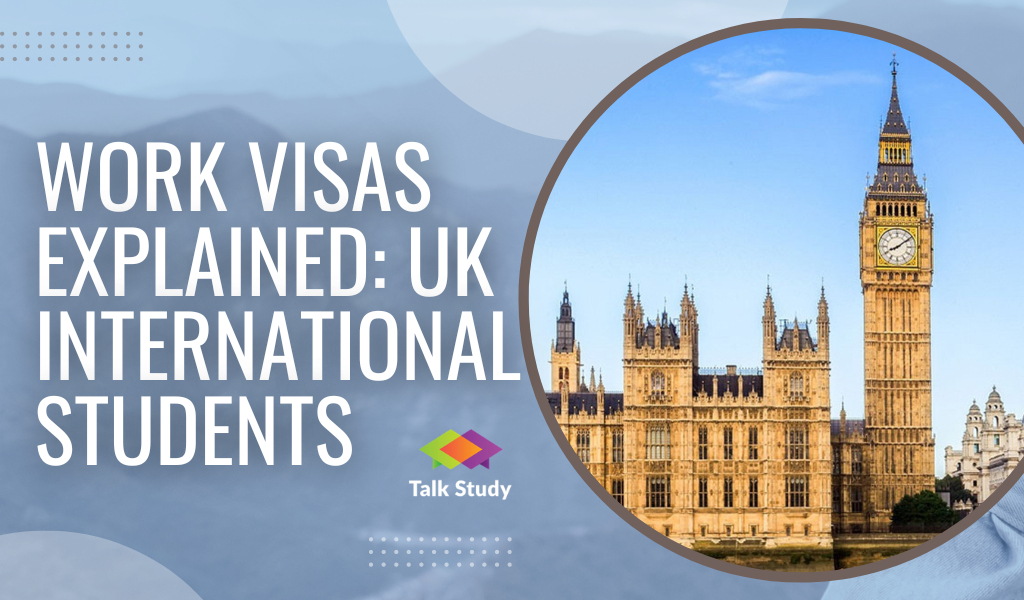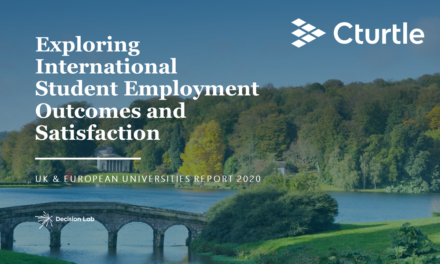Overcoming the difficulties associated with visas, international students, and the UK career path
We will provide you with enough information to help you approach potential employers with greater assurance when discussing visas. You don’t need to become a master to continue the hiring dialogue. You only have to learn enough to respond to typical employer concerns about visas. You will gain knowledge regarding expenses, which will assist you in dealing with employers concerned that they are too costly. Don’t stress about remembering every little thing. After addressing their initial concerns, you can point them toward the resources indicated in this article geared toward employers.
The Graduate Visa and the Skilled Worker Visa are the main topics of this blog. Check out Talk Study if you’re interested in learning about different visa kinds.
The Graduate Visa
First, let’s discuss about the graduate visa.
An overview of the Graduate visa
⦁ 2 years for graduates and 2 years for PhDs;
⦁ There is no needed sponsorship;
⦁ No set minimum for hours worked;
⦁ Frequent job changes;
⦁ Can handle any employment (apart from becoming a professional athlete)
⦁ May work for oneself or as a freelancer.
What is the price?
⦁ The applicant is responsible for the fees (i.e. you pay them)
⦁ £715 is the application fee (covers 2 years)
⦁ The annual immigration health surcharge is £624.
⦁ It’s uncommon for an employer to cover the cost of your graduate visa because this is a personal visa.
=> Total = £1963
What to suggest to a company regarding a graduate visa?
Here, reassurance is the goal. Tell the recruiter or employer that it is a personal visa. With the Graduate visa, there are no obligations on the part of the employer.
What you should emphasize to an employer about the Graduate visa?
- The Graduate Visa is not a Sponsorship Requirement
- There are no employer costs.
- You have the chance to test me out; if you like what you see, we can talk about potential sponsorship later.
You may therefore say something like:
“I’ve already paid for a personal visa, which I need. You can hire me on this visa without doing anything. You don’t have to worry about fees or paperwork because I’ve already taken care of it. There aren’t any limitations on the kind of work I can do or the requirements for a minimum wage. It is a very flexible visa, and neither sponsorship nor a license is necessary.”
Please do not refer to it as a post-study work visa (PSW). You will only create additional confusion by referring to the visa as a PSW because it is a Graduate visa.
Should I talk about how long the Graduate visa lasts?
This one is a little hard. From part 1, we know that some employers are worried about how long the visa will last. Does “I can stay until 2024” sound longer or shorter than “I have a visa for two years”? I’m not sure.
According to the article “Why are so many young people quitting their jobs, and what do they want?” (ISE). It shows that almost a third (30%) of working graduates said they plan to leave their current job this year. 40 percent of 2021 graduates are more likely than those who graduated in 2020 or before to want to change careers. Graduates are leaving their jobs at a record low rate. About 17% of graduates leave their jobs within two years of being hired.
International students who want to stay in the UK might be more committed to their jobs than other students. International students might like working with an employer for two years. Loyalty to an employer is a vast bargaining chip you can use to get what you want from them. You might be happier at work that gives you a Skilled Worker visa after your Graduate visa is over. Why not bring this up when you talk to people about hiring you?
The Skilled Worker visa (sponsorship from an employer)
Picture this. You’re having a conversation with a boss. They think you’re great. You’ve shown them that the Graduate visa makes it easy for them to hire you. It feels like someone is going to offer you a job. Then they say, “Your Graduate visa runs out in 2025. What are you going to do then? Quit and leave?”
It is the right time to talk about sponsorship. Point out that you will want to see your work for two years by then. Tell them that they’ll know how important you are to the team in two years. Tell them that if they aren’t, they don’t have to help you. Then you can explain the Skilled Worker visa to them.
An overview of the Skilled Worker visa
- The company must register as a sponsor with the Home Office;
- The job must require a certain level of skills;
- The income must meet a minimum requirement;
- The applicant must be able to speak English.
What to draw the employer’s attention to?
So, compared to before 2021, sponsorship is more straightforward, less expensive, quicker, and less complicated. Most employers don’t know this. Say to them:
- No Test of the Resident Labor Market. Many employers don’t know that it has been taken off, so it’s important to let them know. Under the old funding principles, UK employers couldn’t hire people from outside the country unless they could prove that a UK job seeker couldn’t do the job.
- All graduates will have the minimum skills needed for a job paid for by a sponsor (RQF 3, which is A-level or equivalent). Similar to this, all graduates will be at least proficient in English because this is the requirement for admission to a university.
- Employers can sponsor as many people as they want.
- With the new visas, it costs less to hire international graduates than it did with the old visas. The minimum wage requirements (“new entrant rate”) are £25,600, £23,040, or £20,480, and this “new entrant rate” is now payable for four years (it used to be 3).
- The Skilled Worker visa is much easier to get than it used to be. The government says 8 out of 10 applications are made within less than 2 months.
How much is it?
Here is where things get a little more complicated because the costs depend on the size of your employer and the type of visa you have. When you apply for a Skilled Worker visa from outside the UK, there are some extra steps you have to take. You don’t have to memorize all of these costs and details. Just having a rough idea of costs is enough. Most recruiters will think paying for a Skilled Worker visa costs a lot. They probably think it’s going to cost more than it does. They might be surprised to learn that sponsoring you could save them more money than hiring and training a new worker.
Costs for the business
Here is a summary of the costs.
- To become a registered sponsor, a small company or charity will pay £536, while a medium or large sponsor will pay £1,476.
- Plus £199 for the Sponsorship Certificate (1 for each person sponsored)
- Immigration Skills Charge £364 per person per year (small businesses) or £1,000 per person per year (Medium or large organizations). Employers who sponsor you while you are still on a student visa are exempt from the Immigration Skills Charge.
Costs for the Individuals
These fees are supposed to be paid by the sponsored student or graduate, but many employers pay for them instead.
- Health Charge for Immigration: £624 per year.
- The fee to apply for a visa is either £719 (3 years or less) or £1,423. (3-5 years)
You may have noticed that these fees are a lot like the fees for the Graduate visa, right?
So, what expenses can I list to the employer?
- Sponsoring someone who already has a Student visa as a small business: £536 + £199
- Sponsoring by a small business or charity: £536 + £199 + £364
- Someone with a Student visa who works for a big company: £1,476 + £199
- Sponsorship by a large company: £1,476 + £199 + £1,000
I hope we’re still together! I know that this seems complicated and has many different costs. If you know how much some of these things cost, you may be able to convince employers that they can afford to pay for you.
Remember that you can provide employers access to this guide if price issues become complex.
How challenging is it for a company to sponsor someone for the first time?
Probably less than what they think! Please look at this employer’s most recent post on LinkedIn, where he says that the procedure was far more accessible than he anticipated.
How an employer can become a sponsor
The employer will have to fill out an application online and send in the following documents:
• Most recent bank statement for a business
• Liability insurance for employers
• Accounts
• Proof of a place of business
• Registrations with HMRC
• Chart of the Order of People (if 50 or fewer people are employed in the company)
• Application information
They will also have to choose some important people:
- An Authorising Officer is a senior member of the organization who is in charge of hiring and will be in the order of the license.
- Key Contact is the UKVI’s main point of Contact.
- Level 1 User: The day-to-day supervisor who reviews the license
Several last tips
Pick your words wisely.
Encourage and bribe employers. Take cautious not to frighten them away. Instead of saying, “you will have to support me,” say, “you could sponsor me.”
“Should I bother with the Graduate visa if my ultimate objective is sponsorship? “
I often receive this question. It’s challenging to respond. Here’s what I believe:
1) There are no guarantees while looking for a job. People’s careers are greatly influenced by chance. Results are hard to guarantee. There is a job opening with a fantastic employer, but you go out for coffee that day and miss the advertisement. Even if you have more remarkable experience, someone else also applies. We are powerless over these elements. As a result, no ideal plan can assure you of landing a specific position by a given date or a sponsoring employer.
2) Employers find it far simpler to get a Graduate visa than to sponsor you. According to home office statistics, having a Graduate visa can give you a greater chance of landing a job in the UK.
3) Employers are humans. Utterly distinctive and unique. Some of them are willing to have their opinions on visas changed. Persuadable people exist. Others aren’t. It isn’t easy to discern which is which until you know them well.
4) The problem is not “either/or.” The graduate visa might be a great backup plan or a way to be sponsored. For instance:
- You look for sponsored positions. To increase your chances of success, begin early and seek out the assistance of your university’s career office with your applications.
- When your student visa runs out, but you haven’t secured a sponsored position, you apply for graduate visas and employment.
- You speak with your manager 1-3 months into your new position. You educate everyone about sponsorship. You apply the techniques covered in parts 1 and 2 of this course. You say you like working there and want to continue doing so. You enquire as to whether they’d be open to it.
- You begin looking for new employment if your supervisor has a fundamental objection to sponsoring. You have time until the Graduate visa expires because of this. Employers that seem receptive to support might be targeted via the Register of Licensed Sponsors at GOV.UK (www.gov.uk). With your expertise in the UK, finding a new job will be more straightforward.
Here’s the unpleasant reality. Many of you will not ever be sponsored. Even if you put forth a lot of effort, you cannot remain in the UK permanently. Would two years of experience in the UK matter to you? Would it impress potential employers back home? Would other nations that you may wish to work in appreciate your UK job experience? You can determine whether the Graduate visa is proper for you by considering the answers to these questions.
Should I include on my resume or cover letter that I’m looking for sponsorship or a graduate visa?
This one also has me undecided. I believe it’s best to hold off on discussing visas until the company expresses interest in you (i.e. your skills, knowledge and experiences). If you decide to put it in your resume or cover letter, my advice is not to make it the first thing they see. Tell them first-rate stuff about you. Put it near the bottom of the page if you include it so that readers will see it last. Employers are creating an opinion of you as they read your CV and cover letter; by considering the sequence in which you tell them things, you may influence the impression they have of you.
To sum up
You have seen recruiting from the employer’s viewpoint if you have read parts 1 and 2. You have considered the advantages UK companies may gain from your particular abilities as an overseas student. You now know a few bargaining techniques to get to the heart of the employer’s immigration worries. Your knowledge of the Graduate and Skilled Worker visas has finally increased. I hope this blog series gave you more extraordinary courage to go beyond some obstacles to getting a job in the UK. Good luck on your quest. I hope everything goes well!
Want more assistance?
Each institution in the United Kingdom employs career specialists like myself. Even after you graduate, many are still willing to assist you. Send them a message when you want to enquire about assistance. They’ll be watching for your response.






Recent Comments